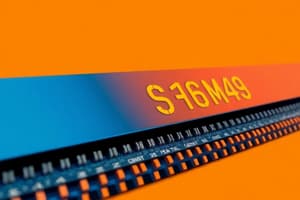Podcast
Questions and Answers
Which type of memory is typically used for the data or program code needed by a computer processor to function?
Which type of memory is typically used for the data or program code needed by a computer processor to function?
- SRAM
- DRAM (correct)
- ROM
- Cache memory
What is the main advantage of random access memory (RAM) over storage media such as hard disk drives and solid-state drives?
What is the main advantage of random access memory (RAM) over storage media such as hard disk drives and solid-state drives?
- RAM enables faster access to data (correct)
- RAM is located close to the computer's processor
- RAM is typically used in personal computers (PCs), workstations, and servers
- RAM is made of bits of data or program code
How are bits of data stored in a DRAM storage cell?
How are bits of data stored in a DRAM storage cell?
- In a flash memory chip
- In a magnetic disk
- In a capacitor and a transistor (correct)
- In a laser diode
Which type of memory is commonly used in personal computers (PCs), workstations, and servers?
Which type of memory is commonly used in personal computers (PCs), workstations, and servers?
What is the main advantage of random access memory (RAM) over storage media such as hard disk drives and solid-state drives?
What is the main advantage of random access memory (RAM) over storage media such as hard disk drives and solid-state drives?
What does random access allow the PC processor to do?
What does random access allow the PC processor to do?
Which type of memory is commonly used for the data or program code needed by a computer processor to function?
Which type of memory is commonly used for the data or program code needed by a computer processor to function?
What is the main advantage of DRAM over storage media such as hard disk drives and solid-state drives?
What is the main advantage of DRAM over storage media such as hard disk drives and solid-state drives?
What does random access allow the PC processor to do?
What does random access allow the PC processor to do?
Flashcards are hidden until you start studying
Study Notes
Types of Memory
- RAM (Random Access Memory) is the primary type of memory used for data and program code required by computer processors.
- DRAM (Dynamic Random Access Memory) is commonly utilized in personal computers, workstations, and servers, functioning as the main memory.
Advantages of RAM
- The key advantage of RAM over storage media like hard disk drives (HDDs) and solid-state drives (SSDs) is speed; RAM allows for much faster data access and retrieval.
- Unlike HDDs and SSDs, RAM enables high-speed data access and processing, enhancing overall system performance.
Storage of Data in DRAM
- Data in a DRAM storage cell is stored using capacitance; each cell consists of a capacitor and a transistor, which represent binary bits (0s and 1s).
- The stored charge in the capacitor reflects a bit of data, but this charge needs to be refreshed periodically due to leakage.
Random Access
- Random access capability allows the PC processor to read or write data from any memory address directly and at high speed, rather than sequentially.
- This enhances the efficiency and speed of data processing, making it crucial for optimal computer performance.
Studying That Suits You
Use AI to generate personalized quizzes and flashcards to suit your learning preferences.




